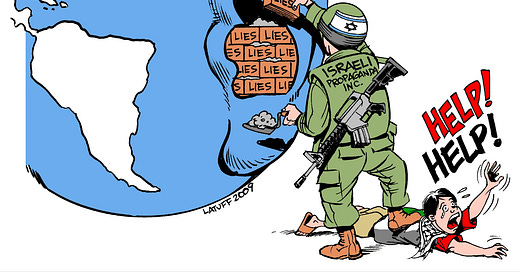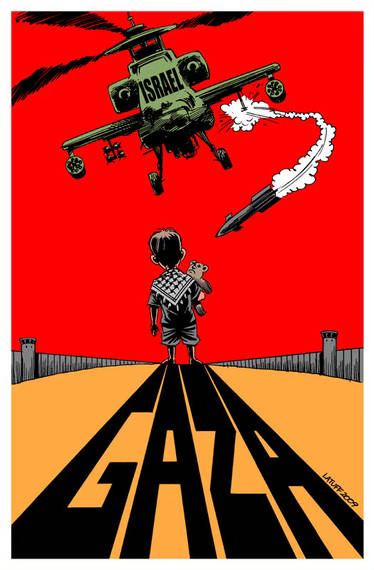The Grand Deception: Israel’s Theft of Common Sense
For 74 years, Israel has engineered, managed and marketed false narratives, images and vocabulary to win the ideological war in the United States. Israel has shaped a message that has made the unacceptable—its brutal occupation of Palestine and its people—acceptable to Western audiences.
The Israeli regime has invested heavily to ensure that an accurate Palestinian narrative is never heard. Feeling certain of its ideological victory, its leaders have grown increasingly ruthless and unrestrained.
The Zionist state was born and has survived by force and dupery. To manufacture legitimacy, the “only democracy in the Middle East,” as it describes itself, has constructed an ambitious state-run public relations industry.
Since its establishment in 1948, Israel has relied on propaganda to maintain its hold on Palestine. Zionist tropes about an empty land, agrarian miracles in the desert and reclaiming an historic promised land have become firmly entrenched.
Fraudulent claims such as that of Israel’s fourth prime minister, Golda Meir (1969-74), who infamously said, “It was not as if there was a people in Palestine and we came and threw them out and took their country away from them. They did not exist.” Such claims have cemented an indelible narrative in the minds of many Americans.
Consequently, most have come to believe the myth that Israel is a progressive humane state; a small but brave nation defending itself against “foreign” violence and terrorism.
The Israeli myth was, however, challenged in the marketplace of public opinion in 1982 and again in 2009.
In 1982, Israel was shaken by the adverse reaction it received for its deadly attack on Lebanon. A year later, the Hasbara Project was born to push the Israeli agenda.
Hasbara (“explaining” in Hebrew) established permanent structures in the United States and Israel to influence how the world, especially Americans, would think about Israel and the Middle East in the future. Israel now labels hasbara propaganda “public diplomacy.”
Like the criticism received over its bombing of Lebanon, Israel came under fire in the aftermath of “Operation Cast Lead” in December 2008 and January 2009. During the military’s massive 22-day bombardment of the Gaza Strip, 1,398 Palestinians and 9 Israelis were killed.
To counteract the criticism, a pro-Israel Washington-based group, The Israel Project (TIP), hired Frank Luntz, a Republican operative and political strategist, to conduct a study on how to fully integrate Israel’s narrative and views into the mainstream media. He reported his findings in a document, meant only for internal use, titled, “The Israel Project’s 2009 Global Language Dictionary.” In 2003, Luntz had, in collaboration with TIP, created a similar document.
Although the 2009 study was leaked to and reported on in Newsweek magazine (July 9, 2009), it had no real impact then or now on how the mainstream media covers or describes Palestine/Israel.
The document’s significance cannot be emphasized enough. Language from the propaganda primer, with its scripted discourse for Israeli advocates, has seeped into the American psyche.
The power of rhetoric to manipulate and convince—the core of Luntz’s guidebook— is essential in understanding how a rogue nation like Israel has been able to escape justice so often and for so long.
The use of repetition, similitude and deception to advance Israel’s image are hallmarks of Luntz’s work. His “language dictionary” is a guide to how best to talk about the Zionist state. The talking points and doublespeak from the playbook can be heard repeatedly in the comments of U.S. and Israeli politicians, officials, academics and mainstream media.
The statement by TIP founder and president, Jennifer Laszlo Mizrahi in the preface is revealing; she writes: “On behalf of our board and team, we offer this guide to visionary leaders who are on the front lines of fighting the media war for Israel. We want you to succeed in winning the hearts and minds of the public….May your words help bring peace and security to Israel and the Jewish people.”
Her statement raises the question of why a “democratic state” would require a media war to win over the public and why security for Israel—not for Palestinians—is the only consideration.
Also, a personal message from the author in the preface embodies the objective of the entire report. Luntz remarks, “And remember, it’s not what you say that counts. It’s what people hear.”
In the handbook, Luntz coaches Israeli supporters on how to tailor answers for different audiences, outlines what Americans want to hear, words and phrases that work and those that don’t; those to be used and those to be avoided. It provides guidance on how best to challenge statements from Palestinians and how to feign compassion for them.
Following are a few examples from the 18-chapter, 116-page primer on how best to sell Israel to the world:
In chapter four, for instance, Luntz instructs Israeli advocates to paint Hamas and Hezbollah as irrational terrorist threats. He states that when Americans are told that Iran supports these groups they will be much more supportive of Israel. Therefore, when talking about them to repeatedly reference “Iran-backed.”
To pacify the majority of Americans who want peace, he advises, in chapter eight,
to always emphasize Israel’s desire for peace, even though the report makes clear the regime does not really want a two-state solution that would lead to peace.
Supporters are enjoined to sell the idea that the so-called “cycle of violence” between the two has been going on for thousands of years, that both sides are equally at fault and that Palestine/Israel is beyond their understanding.
In chapter 10, backers are urged to accentuate Israel’s need for security and its identification with America’s “global war on terrorism. Americans, the study notes, will respond favorably if Israeli civilians are portrayed as the innocent victims of Palestinian terrorism.
Luntz stresses the importance of emphasizing positive themes like peace, mutual respect and empathy for the plight of Palestinians and their children. He writes, “It’s our job to ‘wear white hats in public’—to remind Americans that Israel is a team for whom they can feel good about cheering.”
Among his “25 rules for effective communication,” number four is particularly duplicitous. To counter charges of Israeli brutality against Palestinians, Luntz recommended they say, “…there is one fundamental principle that all peoples from all parts of the globe will agree on: civilized people do not target innocent women and children for death.”
In reality, Israel violates this “fundamental principle” on a daily basis. Deaths and injuries of Palestinian women and children at the hands of Israel’s “civilized” occupation forces abound.
According to the Defense for Children International, Palestine, from January 2000 to May 2022, a total of 2,211 Palestinian children were killed as a result of Israeli military and squatter/colonizer presence in the Occupied Palestinian Territory. The figure does not include children killed while involved in hostilities.
Another manifestation of “civilized” conduct by Israeli forces occurred in 2018-2019, during what has been called “The Great March of Return”—mass demonstrations by unarmed Palestinians at the Gaza-Israel border to protest the then 15-year blockade of the Gaza Strip by Israel. During one-year of peaceful protests, Israeli snipers shot 6,106 Palestinians, killing 189, including 41 children. In addition, 3,098 Palestinian civilians were injured by bullet fragments, rubber-coated metal bullets or hit by tear gas canisters.
A 2019 U.N. Commission of Inquiry report found reasonable grounds to believe that Israeli snipers shot at journalists, health workers, children and persons with disabilities, even though they were clearly visible.
The mainstream media consistently avoids talking about the occupation and Israel’s apartheid practices. When it does, however, it conforms to the official lexicon of the Luntz playbook, the Israeli regime and of its supporters, like TIP.
Israel’s army of occupation, for example, is referred to as “defense” or “security forces.” Zionist squatters on Palestinian land are termed “settlers.” Zionist colonies are deemed “settlements” or “neighborhoods.” Palestinian Occupied Territory is called “disputed territory.” Israel’s concrete barrier wall is labeled a “fence;” and the theft of Palestinian homes is described as “evictions.”
One of the most widely accepted distortions is the idea that there is political and military symmetry between the two sides in what has been falsely labeled a “conflict.” Palestinians resisting colonization and oppression—which is the legitimate right of the colonized—are deceptively labeled “terrorists.”
Israel has successfully sold Americans on the myth of Israel as “willing negotiator” and “peacemaker,” while Palestinians are portrayed as uncompromising extremists, who have rejected every “generous offer” of peace put forth by Israel.
Under the guise of negotiations and willing “partner for peace,” —Oslo Accords, 1993 and Camp David, 2000—-Israel has methodically carried out its plan to colonize what remains of the 22 percent of Palestinians’ ancestral homeland.
The United States and Israel have invaded, attacked and bombed countries that have opposed their plans for the region. Also, they have assassinated anyone who dared stand in their way. All while suffering no consequences. Israel’s leaders know they are accountable to no one.
The targeted assassination of Palestinian-American journalist, Shireen Abu Aqleh in May 2022, is a recent example of the failure to censure Israel. By its tepid response, Washington has sanctioned the cover-up by the Zionist regime.
Israel is finding it increasingly difficult to keep hidden its inveterate system of occupation, apartheid and ethnic cleansing. The hasbara industry, however, remains undaunted.
Israel knows that its narrative is apocryphal and that in its present form, the state is unlawful and unjust. Hence, in an attempt to make the apocryphal real and the fraudulent legal, Israel continues its ongoing information war to normalize the abnormal in Palestine.
(c) 2022, Dr. M. Reza Behnam
Dr. M. Reza Behnam is a political scientist specializing in the history, politics and governments of the Middle East.





